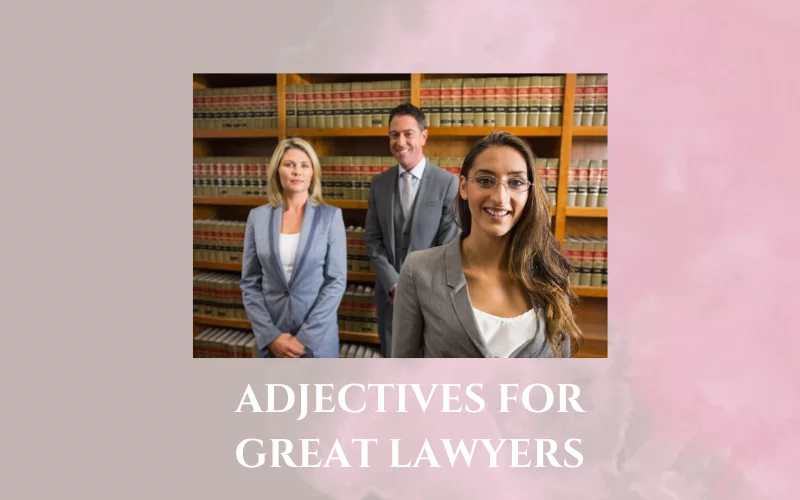Effective Adjectives for Lawyers to Master Communication

Good lawyers provide legal advice using adjectives to describe and accurately represent complex situations. Great lawyers know adjectives are words they need.
Using adjectives to clarify and better describe certain things, people and places is an important skill to master. Especially when it comes to negotiation, specific agreements or representing a client in court.
All good lawyers need to be able to communicate and provide good advice. It’s part of a lawyer’s job description. However, to be truly great at lawyering and to stand out from other attorneys describing words, need to be an essential part of your business vocabulary.
If you are a lawyer who speaks English as a second language and you work in an International environment, you will know how important it is to be professional in your approach to your work. Using focused adjectives when you provide advice will ensure you always do a good job and are able to give any relevant party specific solutions to any problem they are trying to get resolved.
How To Improve Your Legal English Skills In 10 Weeks
Why Lawyers Should Learn Adjectives
Great lawyers can listen, negotiate, think outside the box and use adjectives in a specific and focused way.
Adjectives help you:
- Describe things and situations effectively – this makes your message clear and easy to understand.
- Using adjectives helps you to communicate with empathy – this deepens your relationships and allows you to connect to clients and colleagues.
- Adjectives can be used to help you sound more persuasive which helps you gain power and negotiate better. Adjectives can boost your career.
Learning adjectives should be considered as essential for lawyers whose second language is English.
All lawyers should create a list of adjectives that they can use to help them properly communicate with clients, opposing counsel, and judges. Good communication skills should be viewed as part of an attorneys ethical duty and not treated as an optional extra. This means lawyers should take the time to improve their vocabulary.
Adjectives are words that describe nouns, and they play a critical role in legal writing and communication. The law requires you to be specific and adjectives help you to be both specific and professional.
For example, if we were to talk about a cat, we could simply say,
“I saw a cat.”
However, this sentence lacks ADJECTIVES and so the information is too simple. It is not specific and focused.
If you were asked to find this cat, could you? No, of course not, because you have no words to describe what the cat looks like. You would be unable to search for it with any certainty.
But, if we wanted to give a specific, more precise picture, we would use a list of adjectives to add greater clarity. Adjectives such as large, black and short-haired. With just a short list of adjectives, we can create a more accurate description. You would now be able to focus your search on finding a large, short-haired black cat.
Just a few simple adjectives can help shift people’s perspectives and help find faster solutions to problems and issues.
Using the right adjective can help lawyers accurately convey the meaning of their arguments in law. This is especially important in legal documents, such as pleadings, motions, and contracts.
Adjectives are also used to demonstrate the credibility of your arguments by providing specific and relevant details regarding the case you are handling. As a consequence, they allow you to do better lawyering.
Communicate Effectively with Adjectives
Proper use of adjectives can help lawyers to communicate their ideas more effectively, and it can enhance their persuasion skills in negotiations, settlements, and courtrooms. Especially when combined with other communication tools such as mirroring or labelling.
Adjectives can highlight the strengths and weaknesses of a case, and they can emphasise specific facts or evidence that support a position.
Given these considerations, learning adjectives is a key part of developing strong English language skills for lawyers who are non-native speakers.
By improving their command of adjectives, lawyers can more confidently and effectively communicate with their clients and colleagues, as a consequence they will be improving the quality of their performance in a law firm or corporate situation.
Work with Caryn to Feel Confident Using Adjectives
If you have a growth mindset and are interested in being coached to success consider working with Caryn. You can book a free chat here to talk about options and pricing here.
Differences in adjective use between English and other languages
- Order of adjectives: In English, adjectives typically come in a specific order before the noun they modify (determiner, observation, size, shape, age, color, origin, material, purpose). For example, “a cute little red birdhouse.” However, in some languages, such as Spanish and French, the order of adjectives is more flexible.
- Agreement in gender and number: In many languages, such as Spanish, French, and German, the adjective must agree in gender and number with the noun it modifies. For example, “red house” would be “casa roja” in Spanish if the house is feminine and “casa rojo” if it is masculine. You do not have this problem in English, as English adjectives are gender neutral.
- Overall, adjectives can vary greatly from language to language, and it’s important to understand the differences when learning a new language.
Importance of Adjectives for Lawyers
Adjectives are needed in many situations, whatever, the issue you will always have the opportunity to use an adjective whether you are talking about a future event, presenting an opposite or counter argument or looking to negotiate a better result for your client, a list of adjectives will serve you well.
Adjectives are important because they are needed to:
- A. Clarify legal language.
- B. Make descriptions more accurate.
- C. Enhance communication with clients.
- D. Demonstrate professionalism.
Take the time to research a few adjectives that you can use to give more specific answers.
Learning adjectives for non-native English speaking lawyers is essential for great lawyering.
You don’t need a large list of adjectives. Keep it simple and just master a few adjectives to start with.
Download this free list of adjectives and study guide to get started.
Generated with Pin Generator
⚡ The Influence Pack: Essential Frameworks for Fast Results
Tired of losing impact in English?
Learn how top international lawyers use structure and influence frameworks to win clients, negotiate confidently, and speak with control — **in just a few hours.**
- 📘 Essential Toolkit
- 🎯 Instant Results
- 💬 Designed for Legal Professionals
Enroll now for only £29.99
Start Now →Next step: The Clarity Accelerator — build the full system.
Secure payment • Instant lifetime access



